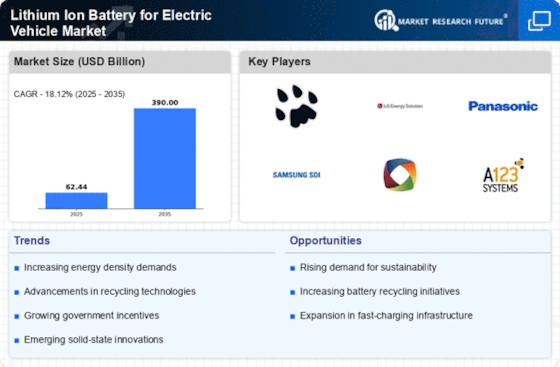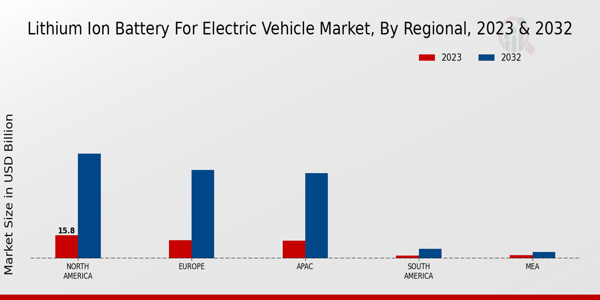Market Growth Projections
The Global Lithium Ion Battery for Electric Vehicle Market Industry is poised for remarkable growth, with projections indicating a market size of 62.4 USD Billion in 2024 and an anticipated increase to 390.0 USD Billion by 2035. This growth trajectory reflects the increasing adoption of electric vehicles and the corresponding demand for advanced battery technologies. The expected compound annual growth rate (CAGR) of 18.12% from 2025 to 2035 highlights the dynamic nature of this market. As manufacturers continue to innovate and improve battery performance, the industry is likely to attract significant investments, further bolstering its expansion.
Government Policies and Incentives
Government policies and incentives play a crucial role in shaping the Global Lithium Ion Battery for Electric Vehicle Market Industry. Many countries are implementing subsidies, tax breaks, and grants to encourage the adoption of electric vehicles. For example, the European Union has set ambitious targets for reducing greenhouse gas emissions, which includes promoting EV usage. Such policies not only stimulate consumer interest but also incentivize manufacturers to invest in lithium-ion battery production. As a result, the market is expected to witness substantial growth, with projections indicating a rise to 390.0 USD Billion by 2035, driven by supportive regulatory frameworks.
Rising Demand for Electric Vehicles
The increasing global demand for electric vehicles (EVs) is a primary driver of the Global Lithium Ion Battery for Electric Vehicle Market Industry. As consumers become more environmentally conscious, the shift towards sustainable transportation options accelerates. In 2024, the market is projected to reach 62.4 USD Billion, reflecting a robust growth trajectory. This trend is further supported by government incentives and regulations aimed at reducing carbon emissions. Countries like China and the United States are leading the charge, with ambitious targets for EV adoption. This growing consumer preference for EVs directly correlates with the rising demand for lithium-ion batteries, essential for powering these vehicles.
Global Shift Towards Renewable Energy
The global transition towards renewable energy sources is influencing the Global Lithium Ion Battery for Electric Vehicle Market Industry. As countries aim to reduce their reliance on fossil fuels, the integration of renewable energy into the grid becomes increasingly important. Lithium-ion batteries serve as a critical component in energy storage systems, enabling the efficient use of renewable energy for electric vehicles. This synergy between renewable energy and electric mobility is expected to drive significant growth in the lithium-ion battery market. The anticipated compound annual growth rate (CAGR) of 18.12% from 2025 to 2035 underscores the potential for expansion in this sector.
Growing Infrastructure for EV Charging
The expansion of charging infrastructure is a vital driver for the Global Lithium Ion Battery for Electric Vehicle Market Industry. As more charging stations become available, consumer confidence in electric vehicles increases, leading to higher adoption rates. Governments and private entities are investing in the development of fast-charging networks, which significantly reduce charging times and enhance the overall EV experience. This infrastructure growth is essential for addressing range anxiety, a common concern among potential EV buyers. The availability of reliable charging solutions is likely to correlate with increased demand for lithium-ion batteries, further propelling market growth.
Technological Advancements in Battery Technology
Technological innovations in lithium-ion battery technology are significantly influencing the Global Lithium Ion Battery for Electric Vehicle Market Industry. Advances in energy density, charging speed, and battery lifespan are enhancing the performance of EVs. For instance, the development of solid-state batteries promises to offer higher energy densities and improved safety features. These advancements are likely to attract more consumers to electric vehicles, thereby increasing the demand for lithium-ion batteries. As the industry evolves, manufacturers are investing heavily in research and development to create more efficient battery solutions, which could further propel market growth in the coming years.














